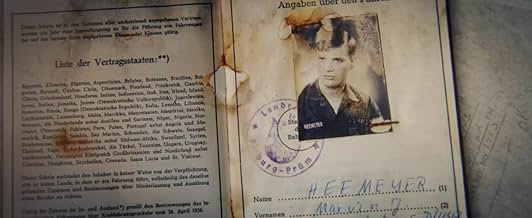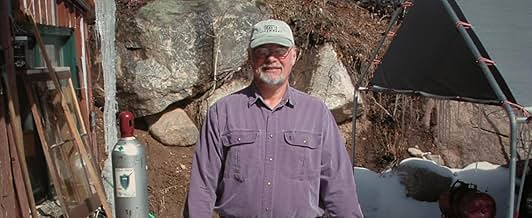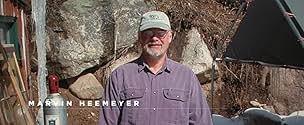Tread
- 2019
- 1 h 29 min
AVALIAÇÃO DA IMDb
7,1/10
3,8 mil
SUA AVALIAÇÃO
Levado ao limite, um mestre soldador de uma pequena cidade no sopé das Montanhas Rochosas silenciosamente fortalece uma escavadeira com 30 toneladas de concreto e aço e busca destruir aquele... Ler tudoLevado ao limite, um mestre soldador de uma pequena cidade no sopé das Montanhas Rochosas silenciosamente fortalece uma escavadeira com 30 toneladas de concreto e aço e busca destruir aqueles que ele acredita que o injustiçaram.Levado ao limite, um mestre soldador de uma pequena cidade no sopé das Montanhas Rochosas silenciosamente fortalece uma escavadeira com 30 toneladas de concreto e aço e busca destruir aqueles que ele acredita que o injustiçaram.
- Prêmios
- 1 indicação no total
Marvin Heemeyer
- Self
- (cenas de arquivo)
Glenn Trainor Jr.
- Self - Grand County Undersheriff 1993 - 2004
- (as Glenn Trainor)
Cody Docheff
- Self - Owner, Mountain Park Concrete
- (cenas de arquivo)
Dick Thompson
- Self - Former Mayor of Granby, CO.
- (cenas de arquivo)
Ron Thompson
- Self - Vice President, Sewer District Board
- (cenas de arquivo)
Avaliações em destaque
This documentary probably doesn't begin to tell the reality of both sides that came to a tragic head when Marv Heemeyer enacted the ultimate "payback". To truly get a picture of what the dynamics at play were we need to have some more folks who knew Marv and have his backstory meticulously fleshed out. Why not? The whole film rides on Marv's final actions so shouldn't we be more privy to his life up until this point? I'm looking to wholly and not coincidently explain how this all came to be.
Anyway, Hollywood loves revenge movies as we all know. Strange as it seems when it is real it is something to absolutely loathe, especially in the case of a man who unprovoked would have just been a "muffler store" owner.
Perspective-wise: no one was injured and only the protagonist died by his own hand. That is still tragic but we all know if this is wholly despicable or not depends on how band Marv was truly treated. That is the flaw here as I just do not find enough even-handed research to shed light on everything the led up to Marv's final, seemingly quite clear-headed, reality break (he wasn't a Blues Bro., but he felt he was on a mission if you follow).
See this. It is a sociology fiasco of unparalleled proportions. It might have been more deadly and it is quite fortunate it wasn't. As such it is a study in human behavior the viewer may well hunger for a more in-depth explanation.
Anyway, Hollywood loves revenge movies as we all know. Strange as it seems when it is real it is something to absolutely loathe, especially in the case of a man who unprovoked would have just been a "muffler store" owner.
Perspective-wise: no one was injured and only the protagonist died by his own hand. That is still tragic but we all know if this is wholly despicable or not depends on how band Marv was truly treated. That is the flaw here as I just do not find enough even-handed research to shed light on everything the led up to Marv's final, seemingly quite clear-headed, reality break (he wasn't a Blues Bro., but he felt he was on a mission if you follow).
See this. It is a sociology fiasco of unparalleled proportions. It might have been more deadly and it is quite fortunate it wasn't. As such it is a study in human behavior the viewer may well hunger for a more in-depth explanation.
Greetings again from the darkness. If not so tragic, this story might fit best in Ripley's Believe it or Not. What better description is there for a small town welder who builds an armored bulldozer, weaponizes it, and then takes it on a rampage of revenge, destroying the buildings, homes, and businesses of those he believe 'wronged' him? This actually happened in Granby, Colorado in 2004, and that welder's name was Marv Heemeyer.
Filmmaker Paul Solet begins the film with a recording of a 911 call and news clips of the actual events of June 4, 2004. Solet then proceeds to lay out the backstory of Heemeyer, and how things escalated to the point where destruction and suicide seemed like the only logical step to him. Solet cleverly utilizes Heemeyer's own self-recording (via audio cassette) as a framing structure for the film. Heemeyer's voice tells us what his plan was, and why he had reached this level of desperation.
Interviews are key, and we hear from law enforcement officers who were on the scene that day, Heemeyer's ex-girlfriend Trisha MacDonald, his best friend, a younger man from his snowmobile club, brothers from a family that had supposedly targeted Marv, and a newspaper reporter, Patrick Brower, who also wrote a book on Heemeyer's rampage. Actual news clips and reenactments are used to show us what those being interviewed tell. In this case, it's an effective approach.
It's particularly interesting to hear that Marv was mostly a likable guy who just bumped up against local town and county politics a couple of times. Marv was not part of the 'good old boys club' and admits to needing to "teach a lesson" to those he perceived has gone out of the way to make life difficult for him. His bulldozer was a way for him to dole out the justice that was otherwise going unserved.
This is a story of revenge told in a somewhat sympathetic manner towards Marv Heemeyer, a man who considered himself "an American Patriot." The audio tape is clearly a confession of what he planned (and later carried out), and it was clear he knew this was a suicide mission. Listening to his rants, we assume some form of mental illness was involved, and his best friend describes him as a man who 'spent too much time alone."
The video clips of the carnage, and of the many law enforcement officials on the scene - all of whom were helpless to stop the bulldozer - are captivating and difficult to watch. Fortunately, after the fact, we know that no one died that day other than the man who was responsible. Marv, a man of "righteous anger", had his day of serving justice and rare 'Bulldozer Rampage' headline knocked off the front page one day later by a much bigger story.
Filmmaker Paul Solet begins the film with a recording of a 911 call and news clips of the actual events of June 4, 2004. Solet then proceeds to lay out the backstory of Heemeyer, and how things escalated to the point where destruction and suicide seemed like the only logical step to him. Solet cleverly utilizes Heemeyer's own self-recording (via audio cassette) as a framing structure for the film. Heemeyer's voice tells us what his plan was, and why he had reached this level of desperation.
Interviews are key, and we hear from law enforcement officers who were on the scene that day, Heemeyer's ex-girlfriend Trisha MacDonald, his best friend, a younger man from his snowmobile club, brothers from a family that had supposedly targeted Marv, and a newspaper reporter, Patrick Brower, who also wrote a book on Heemeyer's rampage. Actual news clips and reenactments are used to show us what those being interviewed tell. In this case, it's an effective approach.
It's particularly interesting to hear that Marv was mostly a likable guy who just bumped up against local town and county politics a couple of times. Marv was not part of the 'good old boys club' and admits to needing to "teach a lesson" to those he perceived has gone out of the way to make life difficult for him. His bulldozer was a way for him to dole out the justice that was otherwise going unserved.
This is a story of revenge told in a somewhat sympathetic manner towards Marv Heemeyer, a man who considered himself "an American Patriot." The audio tape is clearly a confession of what he planned (and later carried out), and it was clear he knew this was a suicide mission. Listening to his rants, we assume some form of mental illness was involved, and his best friend describes him as a man who 'spent too much time alone."
The video clips of the carnage, and of the many law enforcement officials on the scene - all of whom were helpless to stop the bulldozer - are captivating and difficult to watch. Fortunately, after the fact, we know that no one died that day other than the man who was responsible. Marv, a man of "righteous anger", had his day of serving justice and rare 'Bulldozer Rampage' headline knocked off the front page one day later by a much bigger story.
This news story always stuck in my mind when it was 1st reported well over a decade ago so I was intrigued to learn more about it. "Tread" tells the story of a man getting revenge on City Hall & building a marvel of a machine to exact it with. The film does a brilliant job at setting everything in motion, covering all sides of small town politics & a gifted welder driven to madness. Fortunately no one was seriously hurt during his rampage so there is nothing you have to turn your head away from while watching it. The incredible act of destruction is captured with actual news footage, photographs & some recreation. It'll give any action movie fan a rush. Do NOT let this documentary escape your attention.
Just like the Michael Douglas movie "Falling Down", this tragic documentary presents the viewer with an average guy who gets kicked repeatedly and eventually has enough.
I don't think they did a very good job in this documentary exploring the aspect of what, if any, actual corruption was involved in the town's actions against Marv, which is an unfortunate omission. They just interviewed a few of them and we should take it on faith that these people are on the up and up, apparently. Anyone with a cynical eye towards our dear leaders know better than that.
One could only wonder what the narrative would be like in 2020 with rampant protests across the US. Would Marv be viewed as a "peaceful" protester, "peacefully" destroying a city while "peacefully" shooting at cops and "peacefully" trying to murder people he disagrees with? Is he an anti-hero in today's anti-cop/anti-government context?
Had the documentary been produced in the midst of today's (summer of 2020) news cycle, maybe they would have spun it different? Makes you think.
I don't think they did a very good job in this documentary exploring the aspect of what, if any, actual corruption was involved in the town's actions against Marv, which is an unfortunate omission. They just interviewed a few of them and we should take it on faith that these people are on the up and up, apparently. Anyone with a cynical eye towards our dear leaders know better than that.
One could only wonder what the narrative would be like in 2020 with rampant protests across the US. Would Marv be viewed as a "peaceful" protester, "peacefully" destroying a city while "peacefully" shooting at cops and "peacefully" trying to murder people he disagrees with? Is he an anti-hero in today's anti-cop/anti-government context?
Had the documentary been produced in the midst of today's (summer of 2020) news cycle, maybe they would have spun it different? Makes you think.
"When you visit evil on someone, believe me, it will be visited on you." Marv Heemeyer
And so, you get to see the most bizarre documentary this year at a time when you may have had just enough of formulaic dramas on demand. Netflix brings us Marv, who is so pissed at the small town of Granby, Colorado, that he outfits a giant Kubota bulldozer like a tank and wrecks a serious number of buildings.
We don't remember this tragic and sometimes amusing incident from 2004 because we were grieving the day after for Ronald Reagan. Now, however, we can relive the bizarre event and give it its just due in Paul Solet's magnetizing documentary called Tread, for obvious reasons. I've lived in a small town like that (pop about 2000) where life can be unforgiving with slights remembered, rumors deadly, and good ol' boys rule not always to a working stiff's benefit.
It's not important to know who is right or wrong. Rather it is discouraging to know that neither side is right and that provincialism thrives as could be expected in blue collar enclaves where zoning and sewage district decisions are not made by God but by petty bureaucrats, who can change a modest welder's life to their advantage and his distinct outrage.
After setting the scene of growing acrimony, Solet shows original footage and voiceovers to chronicle the tank's journey, helicopter and drone shots, and a few restaged moments to try to replicate the eccentricity of the event. Marv's cassette tape testimony is the most interesting, for he barely reveals his rage in favor of his apocalyptic predictions. No one can stop the giant as it targets the buildings and homes of Marv's perceived enemies.
Working-class outrage does gets lost in sheer wonder at the forbidding destroyer, perhaps echoing our own numbed inability to stop a pandemic or a destructive political machine. Yet, as almost low-key as this revenge is, it is nonetheless true, and a bit of our outrage rides inside with Marv.
Tread seems to hold our abiding struggles as if in a nightmare where we tread on our perceived enemies and forget the lessons of tolerance our parlous times demand of us.
You'll not move from your seat in disbelief. It makes being cooped up worth while for 89 minutes.
And so, you get to see the most bizarre documentary this year at a time when you may have had just enough of formulaic dramas on demand. Netflix brings us Marv, who is so pissed at the small town of Granby, Colorado, that he outfits a giant Kubota bulldozer like a tank and wrecks a serious number of buildings.
We don't remember this tragic and sometimes amusing incident from 2004 because we were grieving the day after for Ronald Reagan. Now, however, we can relive the bizarre event and give it its just due in Paul Solet's magnetizing documentary called Tread, for obvious reasons. I've lived in a small town like that (pop about 2000) where life can be unforgiving with slights remembered, rumors deadly, and good ol' boys rule not always to a working stiff's benefit.
It's not important to know who is right or wrong. Rather it is discouraging to know that neither side is right and that provincialism thrives as could be expected in blue collar enclaves where zoning and sewage district decisions are not made by God but by petty bureaucrats, who can change a modest welder's life to their advantage and his distinct outrage.
After setting the scene of growing acrimony, Solet shows original footage and voiceovers to chronicle the tank's journey, helicopter and drone shots, and a few restaged moments to try to replicate the eccentricity of the event. Marv's cassette tape testimony is the most interesting, for he barely reveals his rage in favor of his apocalyptic predictions. No one can stop the giant as it targets the buildings and homes of Marv's perceived enemies.
Working-class outrage does gets lost in sheer wonder at the forbidding destroyer, perhaps echoing our own numbed inability to stop a pandemic or a destructive political machine. Yet, as almost low-key as this revenge is, it is nonetheless true, and a bit of our outrage rides inside with Marv.
Tread seems to hold our abiding struggles as if in a nightmare where we tread on our perceived enemies and forget the lessons of tolerance our parlous times demand of us.
You'll not move from your seat in disbelief. It makes being cooped up worth while for 89 minutes.
Você sabia?
- CuriosidadesMarvin Heemeyer posthumously attained the nickname "Killdozer" due to his rampage.
- ConexõesReferenced in The Cinema Snob: Thunder Warrior (2022)
Principais escolhas
Faça login para avaliar e ver a lista de recomendações personalizadas
- How long is Tread?Fornecido pela Alexa
Detalhes
- Data de lançamento
- País de origem
- Idioma
- Também conhecido como
- Бульдозер
- Locações de filme
- Granby, Colorado, EUA(location)
- Empresas de produção
- Consulte mais créditos da empresa na IMDbPro
Bilheteria
- Faturamento bruto nos EUA e Canadá
- US$ 36.527
- Fim de semana de estreia nos EUA e Canadá
- US$ 10.585
- 23 de fev. de 2020
- Faturamento bruto mundial
- US$ 36.527
- Tempo de duração
- 1 h 29 min(89 min)
- Cor
Contribua para esta página
Sugerir uma alteração ou adicionar conteúdo ausente


![Trailer [EN]](https://m.media-amazon.com/images/M/MV5BYmVkZTY0MmEtNzBiZi00NWI5LWJjOGEtZjhlMjhhZGI2MmQ5XkEyXkFqcGdeQXRyYW5zY29kZS13b3JrZmxvdw@@._V1_QL75_UX500_CR0)
































